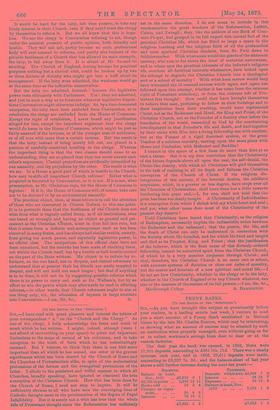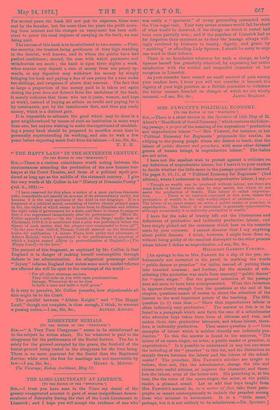PENNY BANKS.
170 THE EDITOR OF TRH "SPEOTAT011.1 SIR,—As you have brought this subject so prominently before your readers, in a leading article last week, I venture to send you a short account of a Penny Bank established in Bethnal Green by the late Mr. Charles Buxton, which may be interesting,. as showing what an amount of success may be attained by such an institution when properly managed, even without going as far- es to collect workmen's savings from door to door or at the various factories.
The first year the bank was opened, in 1852, there were 17,901 deposits, amounting to £.851 108. 11d. There was a steady increase each year, and in 1862, 29,611 deposits were made, amounting to 13,237 7s. 3d., and the balance-sheet of last year shows a still further increase during the next ten years :—
RECEIPTS.
Balance in hand,
PAYMENTS.
Deposits withdrawn £4,956 7 2
£2,218 0 1 Interest ... 24 18 7
Nov.' 1871 ...
32,726 deposits ... 5,289 12 11 Expenses ... ... 65 14 3 Books sold ... 12 5 4 Balance in hand, Nov.,
Charges on repay-
1872 ... 2,578
1 5
28 4 8
Interest ... ... 76 18 5
£7,625 1 5
£7,625 1 5 For several years the bank did not pay its expenses, these were met by the founder, but for more than ten years the profit accru- ing from interest and the charges on repayment has been euffi- cient to cover the total expense of carrying on the bank, no rent being paid.
The success of this bank is to be attributed to two causes : —First, the security, the trustees being gentlemen of very high standing in the district, well known, and in whom the public have had perfect confidence ; second, the ease with which payments and withdrawals are made ; the bank is open three nights a week, when anyone may deposit a sum of money from one penny up- wards, or any depositor may withdraw his money by simply bringing his book and paying a fine of one penny for a sum under ten shillings, and twopence if above that amount. The fact that to large a proportion of the money paid in is taken out again daring the year does not detract from the usefulness of the bank, it merely indicates that those who use it (men, women, and boys at work), instead of buying an article on credit and paying for it by instalments, put by the instalments first, and then pay ready money, which is a distinct gain.
It is impossible to estimate the good which may be done in a poor neighbourhood by means of such an institution in more ways than one, but anyone wishing to make the experiment of establish- ing a penny bank should be prepared to sacrifice some time in personally superintending its working, and also to wait a few years before expecting much fruit from his labours.—I am, Sir, &c., T. F. R.



































 Previous page
Previous page